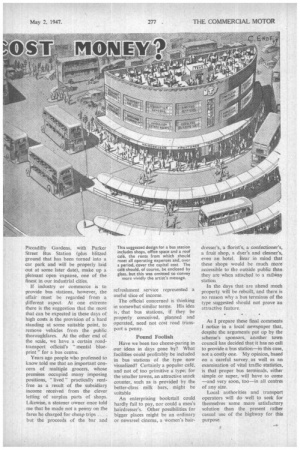Piccadilly Gardens, with Parker Street Bus Station (plus blitzed ground
Page 37

If you've noticed an error in this article please click here to report it so we can fix it.
that has been turned into a car park and will be properly laid out at some later date), make up a pleasant open expanse, one of the finest in our industrial cities.
If industry or commerce is to provide bus stations, however, the affair must be regarded from a different aspect. At one extreme there is the suggestion that the most that can be expected in these days of high costs is the provision of a hard standing at some suitable point, to remove vehicles from the public thoroughfares. At the other end of the scale, we have a certain roadtransport official's "mental blueprint" for a bus centre.
Years ago people who professed to know told me that an important concern of multiple grocers, whose premises occupied many imposing positions, " lived " practically rentfree as a result of the subsidiary income received from the clever letting of surplus parts of shops. Likewise, a steamer owner once told me that he made not a penny on the fares he charged for cheap trips . . . . but the proceeds of the bar and
refreshment service represented a useful slice of income.
The official concerned is thinking in somewhat similar terms. His idea is. that bus stations, if they be properly conceived, planned and operated, need not cost road transport a penny.
Pound Foolish
Have we been too cheese-paring in our ideas in days gone by? What facilities could profitably be included in bus stations of the type now visualized? Certainly a popular café, and not of too primitive a type; for the smaller towns, an attractive snack counter, such as is provided by the better-class milk bars, . might be suitable
An enterprising bookstall could hardly fail to pay, nor could a men's hairdresser's. Other possibilities for bigger places might be an ordinary or newsreel cinema, a women's hair dresser's, a florist's, a confectioner's, a fruit shop, a dyer's and cleaner's, even an hotel. Bear in mind that these shops would be much more accessible to the outside public than they are when attached to a railWay station
In the days that are ahead much property will be rebuilt, and there is no reason why a bus terminus of the type suggested should not prove an attractive feature.
As I prepare these final comments
notice in a local newspaper that, despite the arguments put Up by the scheme's sponsors, another town council has decided that it has no call to provide a bus station—in this case, not a costly one. My opinion, based on a careful survey as well •as an examination of vital traffic statistics, is that proper bus terminals, either simple or super, will have to come —and very soon, too—in all centres of any size.
Local authorities and transport operators will do well to seek for themselves some more satisfactory solution than the present rather casual use of the highway for this purpose.












































































